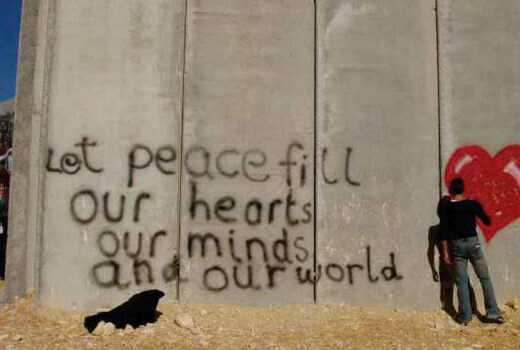hankyoreh
Links to other country sites 다른 나라 사이트 링크
The birthplace of Jesus now like a prison

By Lee Seung-jeong, Ph.D. candidate at University of London
BETHLEHEM, West Bank - Yesterday was Christmas. If you can spend this day in Bethlehem, you will remember it for all of your life, even if you are not a Christian. Bethlehem is widely known as the place where Jesus was born over 2,000 years ago. For many people, Bethlehem may be remembered as a village in the Bible, or as a small town in Israel, rather than a real city. Modern Bethlehem, however, is a Palestinian city in the West Bank. Since the Six-Day War in 1967, Bethlehem has been occupied by Israeli military forces. This small city with a population of about 30,000 has been transformed into a large, walled prison.
People coming in and out of Bethlehem, which is just 10 km to the south of Jerusalem, must pass through a checkpoint. The checkpoint itself is a place of sorrow and anger.
Entering the checkpoint, there are three or four revolving doors through which only one person can pass at a time. The doors have a green light and a red light. When the green light briefly turns on, the doors revolve. There are no Israeli soldiers directly manning the doors; they are seen only through thick glass and heard on loudspeakers. The doors are mechanically operated, and create a situation in which Palestinians push and fight one other to pass through. The doors are frequently locked when too many people rushing to gain entry.

The West Bank town of Ramallah where I am staying is Palestine’s administrative capital, just 20 km north of Jerusalem. It takes less than 30 minutes from Ramallah to Bethlehem using a car with Israeli plates driven by a foreigner, while it takes over three hours for a Palestinian car to make the same journey. Palestinians must have a special license to pass through the checkpoint, but even if they have this license, it is difficult for them to gain passage.
It is unbelievable that such outrageous racial discrimination exists in the 21st century.
People coming out of the checkpoint are faced with eight or nine-meter-high huge concrete walls, the barriers separating Bethlehem and Jerusalem. Israel claims that the barriers are "security fences" to prevent terror attacks. However, they are one of the results of Israel’s policy of occupation, meant to cut ties between Bethlehem and Jerusalem, which was the center of Palestinian culture, religion, and economy for centuries.
Israel began to build the 700km-long barriers in August 2002 under the pretext of war against terrorism. The barriers will one day completely surround the Palestinian region.
In certain regions, Israel sets electric barbed wire atop 3-meter-high concrete walls, or it digs nearly 4-meter-deep grooves around the walls. In Bethlehem, as well, 8-9 meter high concrete walls tower over the city’s borders. The barriers seen from the Israeli side are disguised by trees or other objects, and therefore aren’t easily seen by citizens or tourists. However, seen from the Palestinian side, their stark existence arouses fear.
Palestinians owning orchards or land across the barriers cannot access their land. There are Palestinian families that were separated by the walls, and children that suddenly could not travel to their schools. The economy has collapsed, since the movement of persons and commodities has been restricted.
There are 43 completed checkpoints along the 129-km-long barrier of the northern part of Palestine territory. There are up to about 700 checkpoints in the Israeli-occupied Palestinian regions.
Can separation, not coexistence, bring peace? Can rule by monopolization and military force establish peace? The tragedy of Israel lies in the fact that it does not know how to make peace, no matter what abilities it has to win a war.
Many pilgrims visit this Holy Land. They follow the past achievements of Jesus, but it is a tragedy that He still shares the fate of persons being persecuted in this Holy Land.
Please direct questions or comments to [englishhani@hani.co.kr]
Editorial・opinion
![[Column] Season 2 of special prosecutor probe may be coming to Korea soon [Column] Season 2 of special prosecutor probe may be coming to Korea soon](https://flexible.img.hani.co.kr/flexible/normal/500/300/imgdb/original/2024/0426/3317141030699447.jpg) [Column] Season 2 of special prosecutor probe may be coming to Korea soon
[Column] Season 2 of special prosecutor probe may be coming to Korea soon![[Column] Park Geun-hye déjà vu in Yoon Suk-yeol [Column] Park Geun-hye déjà vu in Yoon Suk-yeol](https://flexible.img.hani.co.kr/flexible/normal/500/300/imgdb/original/2024/0424/651713945113788.jpg) [Column] Park Geun-hye déjà vu in Yoon Suk-yeol
[Column] Park Geun-hye déjà vu in Yoon Suk-yeol- [Editorial] New weight of N. Korea’s nuclear threats makes dialogue all the more urgent
- [Guest essay] The real reason Korea’s new right wants to dub Rhee a founding father
- [Column] ‘Choson’: Is it time we start referring to N. Korea in its own terms?
- [Editorial] Japan’s rewriting of history with Korea has gone too far
- [Column] The president’s questionable capacity for dialogue
- [Column] Are chaebol firms just pizza pies for families to divvy up as they please?
- [Column] Has Korea, too, crossed the Rubicon on China?
- [Correspondent’s column] In Japan’s alliance with US, echoes of its past alliances with UK
Most viewed articles
- 1Samsung subcontractor worker commits suicide from work stress
- 2Division commander ordered troops to enter raging flood waters before Marine died, survivor says
- 3‘We must say no’: Seoul defense chief on Korean, USFK involvement in hypothetical Taiwan crisis
- 4No good, very bad game for Korea puts it out of Olympics for first time since 1988
- 5[Column] Season 2 of special prosecutor probe may be coming to Korea soon
- 6[Editorial] Korea’s surprise Q1 growth requires objective assessment, not blind fanfare
- 7Korea’s 1.3% growth in Q1 signals ‘textbook’ return to growth, says government
- 8US overtakes China as Korea’s top export market, prompting trade sanction jitters
- 9[Column] Has Korea, too, crossed the Rubicon on China?
- 1046% of cases of violence against women in Korea perpetrated by intimate partner, study finds